

Zen Guide: The Comprehensive Guide to Zen & Buddhism - Principles, Discussion, Practice, Community and Resources including RSS feeds. - ZENGUIDE.COM. Nine Essential Qualities of Mindfulness. Meditation is one aspect of mindfulness Most people these days are stressed out by the fast pace of life, economy, and worries about the future. In a recent survey, conducted in the UK, a whopping 86 percent agreed that "people would be much happier and healthier if they knew how to slow down and live in the moment" (Mental Health Foundation, 2010). It is no wonder that mindfulness has rapidly gained attention in the popular press and is one of the few complementary medicine techniques to be offered in hospitals and clinics worldwide.
But what exactly is mindfulness? Mindfulness is a mind-body medicine practice, based on ancient Zen Buddhist meditation techniques, that was popularized by Jon Kabat-Zinn, a researcher at the University of Massachusetts Medical School. 10 things science (and Buddhism) says will make you happy.
I’m a science geek as well as a Buddhist geek, and recently when I was leading a retreat on how to bring more joy into our lives I found myself making a lot of references to an article published in Yes magazine, which touched on ten things that have been shown by science to make us happier.
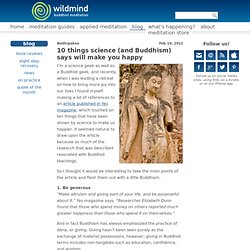
It seemed natural to draw upon the article because so much of the research that was described resonated with Buddhist teachings. So I thought it would be interesting to take the main points of the article and flesh them out with a little Buddhism. 1. Be generous“Make altruism and giving part of your life, and be purposeful about it,” Yes magazine says. “Researcher Elizabeth Dunn found that those who spend money on others reported much greater happiness than those who spend it on themselves.”
And in fact Buddhism has always emphasized the practice of dana, or giving. Links to 101 Zen Stories - Global One TV. Bob Thurman says we can be Buddhas. Buddhism - The History, Philosophy and Practice of Buddhism - Start Page. Psalms of the Early Buddhists: I. Psalms of the Sisters. 'I laughed. I rose. I was glad the long day was before me.'OLIVE SCHREINER. London PUBLISHED FOR THE PALI TEXT SOCIETY BY HENRY FROWDE OXFORD UNIVERSITY PRESS WAREHOUSE, AMEN CORNER, E.C. 1909 (In the Pali names pronounce the vowels as in Italian, but the unaccented a like u in nut.
BOOK titles are necessarily brief. No one, not even, I imagine, a pious Buddhist, believes that these verses contain the ipsissima verba of those members of the Order to whom they are ascribed, or that these notable adherents conversed in Pali ślokas. Guest Voices: The Buddha wasnt a Buddhist - On Faith at washingtonpost.com. By Dzogchen Ponlop RinpocheTibetan Buddhist teacher If we want to be free of the pain we inflict on ourselves and each other — in other words, if we want to be happy — then we have to learn to think for ourselves.
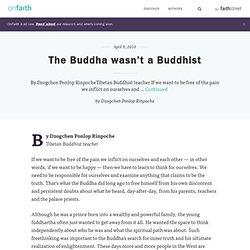
We need to be responsible for ourselves and examine anything that claims to be the truth. That’s what the Buddha did long ago to free himself from his own discontent and persistent doubts about what he heard, day-after-day, from his parents, teachers and the palace priests. Although he was a prince born into a wealthy and powerful family, the young Siddhartha often just wanted to get away from it all. Mind in Indian Buddhist Philosophy. 1.
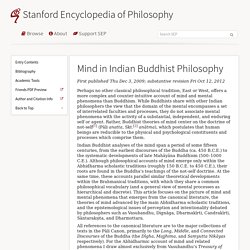
History of the Issue Buddhist conceptions of mind evolved from early attempts to offer a systematic account of human experience as described in the large body of discourses attributed to the Buddha. The Buddha offered an account of the human individual as a composite of various psychological and physical elements that challenged the prevailing philosophical views, dominated by the Upaniṣadic idea of an enduring, substantive self (ātman). This aggregated view of persons became the object of early and extensive scholastic debates as Buddhists sought to explain how we come to mistakenly apprehend an unchanging and enduring self in a stream of causally interconnected phenomena. 1.1 The Not-Self Doctrine In one of his earlier discourses, the Buddha declares that we ought to regard any form of sensation and consciousness, whether “past, future, or present; internal or external; manifest or subtle...as it actually is...: ‘This is not mine. Psychology Today - StumbleUpon.
The Metropolitan Museum of Art - StumbleUpon. The essential element of Zen Buddhism is found in its name, for Zen means "meditation.
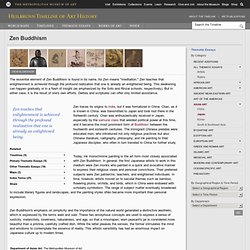
" Zen teaches that enlightenment is achieved through the profound realization that one is already an enlightened being. Spirit Vaults : Meditation - StumbleUpon. Buddhism Vaults : Dalai Lamas Heart Sutra Talk, May 2001, SF Bay Area, California, Day 1 of 3. by Dave Evans - StumbleUpon. Day 2Day 3 Introduction Today I was fortunate enough to sneak out of work for a few hours to hear His Holiness the Dalai Lama began a lecture on the Heart Sutra.
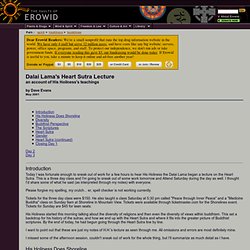
This is a three day class and I'm going to sneak out of some work tomorrow and Attend Saturday during the day as well. I thought I'd share some of what he said (as interpreted through my notes) with everyone. Please forgive my spelling, my crutch... er, spell checker is not working currently.